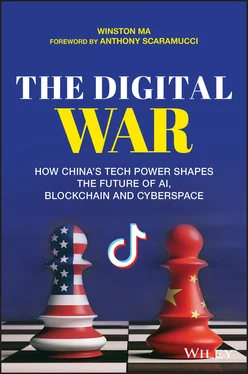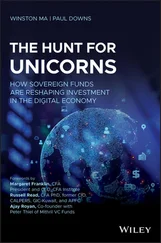1 ...8 9 10 12 13 14 ...17 Furthermore, Tencent formed a new technology committee that better coordinates fundamental technology research in different parts of the company. Tencent's restructuring marks a “significant strategic upgrade” for the company and comes as its main business of gaming and online services began to grow at a slower pace. As publicly stated by Pony Ma, Tencent's founder and chairman, “the next era of the internet is the industrial internet”, and Tencent will, in reaction, develop new industry-facing services to “connect industries and consumers to build a more open ecosystem”.
Meanwhile, technically savvy and internationally educated entrepreneurs, with compelling technologies, have easily attracted venture capital for startups that bring niche AI applications to a broader market. Computer vision (CV), for example, is the science for computers or robots to duplicate the way humans perceive and visually sense the world around them. Facial recognition technology, in particular, has been widely used in public security applications, with public security authorities using the technology to spot suspected criminals and even jaywalkers.
In the computer vision sector, Megvii, SenseTime, Yitu Technology, and CloudWalk are collectively referred to as China's “Four CV Dragons”. The Four Dragons' growth coincides with China's full embrace of facial recognition technology and its integration into the daily lives of the Chinese population. In recent years, CV companies have also used the AI technologies to transform a variety of industries from finance to entertainment, transport to healthcare, and more.
Megviifocuses on face detection, recognition, and analysis across different platforms. Its core product Face++ is a cloud-based face recognition technology platform, and it has been widely applied in various industries. Through a partnership with Alibaba, Face++ has been integrated into Alipay (the widely used mobile payment platform) to support facial scan logging in and Smile to Pay, a payment method that allows users to make a purchase by scanning their faces. Face++ is also integrated into smart city applications, where it's deployed to optimize traffic flows and “see” incidents that require police or medical attention. In line with the AI product's name, the Megvii technology is similarly used by Meitu, the popular beauty-enhancing photo editing application. (The Meitu, which means “beautify pictures” in Chinese, app offers features that can remove wrinkles, smooth pores, and lengthen legs in photos.)
SenseTimespecializes in deep learning-enabled computer vision technologies, such as facial recognition technology that can be applied to payment and picture analysis for bank card verification and security systems. SenseTime has supplied automatic face scanning systems to many railway stations and airports across China, with a near perfect accuracy rate. For example, it has signed agreements with China's largest subway operator, Shanghai Shentong Metro Group, to use AI to monitor metro traffic. At US$7.5 billion (according to media reports in late 2019, following a recent round from investors, including SoftBank Group), SenseTime is the world's highest-valued AI startup. According to South China Morning Post 's 2019 internet report, SenseTime and Megvii are major exporters of AI solutions for security and surveillance in government and commercial markets across Southeast Asia, Latin America, and Africa.
Yitu Technologyoperates a cloud-based visual recognition engine that enables computers to detect and recognize faces and cars. The system has been mostly used in surveillance and crowd-tracking, and the company's clients include state authorities such as China Customs and China Immigration Inspection. Cloudwalkhas also been the leading AI tech supplier for China's banking industry.
Natural language processing (NLP) technology is another example. iFlytek, China's leading speech-recognition company that creates voice recognition software, has changed the way doctors write up medical records, thus giving them more time to spend with patients. Traditionally, doctors have to spend much of their time writing up patients' medical records every day. They usually write them between surgeries and very often stay in the office after working hours to finish the paperwork. iFlytek's speech-recognition application was tested at hospitals, where doctors could record their diagnoses vocally at “considerably high accuracy”.
iFlyteck has also developed more than 10 voice-based mobile products covering education, communication, music, and intelligent toys. It has won a series of worldwide speech and AI competitions, including the Blizzard Challenge, reportedly the most authoritative international competition in speech synthesis. As such, iFlyteck was named by China's MOST (Ministry of Science and Technology) to be the national AI champion for speech recognition, along with AlibabaGroup (smart city initiatives), Baidu(autonomous driving), Tencent (computer vision in medical diagnosis), and SenseTime (intelligent vision).
Collectively, the established internet firms and tech startups are investing billions in building new research centers, hiring experienced AI experts and young data scientists, and even setting up labs in the US’ Silicon Valley to work on the latest algorithms, smart robotics, and self-driving cars. Tencent even created its own version of a Go-playing AI program called Jueyi (or FineArt in English), but only after AlphaGo had already retired; hence, there was no chance for the two AI programs to meet in a direct contest. Nevertheless, the AI race between Chinese and US tech companies is on.
5G iABCD New Infrastructure
If Chinese companies’ embrace of AI has been resolute and aggressive, the decisive commitment from the Chinese government, which has announced a sweeping vision for AI and digital economy excellence through a series of policies and initiatives (see Table 1.2), is truly extraordinary. Perhaps it was a coincidence of timing, but soon after the Wuzhen Go match, China's central government released “A Next Generation Artificial Intelligence Development Plan” in July 2017.
Table 1.2 Major Chinese national and local government strategy and policy initiatives relating to AI and the smart internet (2013–2020)
| Name |
Issuer |
Date |
Focus |
| Promote “ Information Consumption” to Increase Domestic Consumption |
State Council |
August 2015 |
To use information technology to promote more domestic consumption (such as e-commerce) |
| “ Broadband China” strategy |
State Council |
August 2015 |
To significantly improve the country's information infrastructure, including 4G network coverage to cover all the cities |
| “ Internet+” Action Plan |
State Council |
May 2015 |
To develop internet access for industries, and leverage AI to create new services and applications |
| “Internet+” and AIThree-year Action Plan |
NRDC |
May 2016 |
To develop a fundamental AI ecosystem and produce world-class AI enterprises |
| Next Generation Artificial IntelligenceDevelopment Plan |
State Council |
July 2017 |
Setting out roadmap for China to reach global AI leadership position by 2030 |
| Three-year Plan for Next Generation AIDevelopment (2018–2020) |
MIIT |
December 2017 |
Setting near-term guidelines based on the national AI Strategy |
| Artificial Intelligence InnovationAction Plan at Higher Education Institutions |
MOE |
April 2018 |
To establish at least 50 AI academic and research institutes by 2020 |
| “ Intelligence Plus” Imitative |
State Council |
March 2019 |
To implement AI to transform and upgrade manufacturing industries |
| Guidelines for Market-based Allocation of Production Factors |
Communist Party of China Central Committee and the State Council |
March 2020 |
Defining data as a new type of production factor, on par with land, labor, capital and technology |
| New InfrastructureInitiative |
State Council |
May 2020 |
Calling for quickening the pace of new infrastructure investment for digital economy |
Note: State Council– China's Central Government; NDIC—National Development and Reform Commission; MIIT—Ministry of Industry and Information Technology; MOE—Ministry of Education.
Читать дальше












